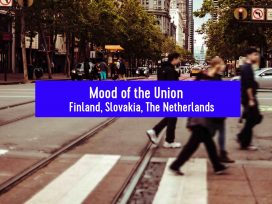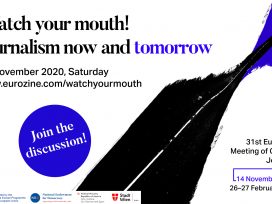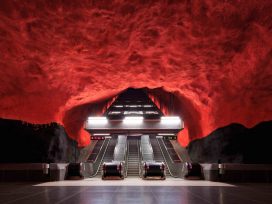As with most of things in life, my (love) affair with the European meetings of cultural journals began by accident. After thirteen years the affair is still going on.
In 1995, while I was a fellow at Institute for Human Sciences (IWM) in Vienna, I was seriously considering the idea of returning permanently from Canada to my native Slovakia. It would be to return to a place that until 1989 I had thought I would never see again.
As a comeback
entrée I was contemplating founding a journal. It was not – I wanted to believe then and I still do – simply to impress my fellow Slovaks but out of sheer necessity. I had been coming back to Czechoslovakia/Slovakia since the fall of the Communist regime in 1989 – enjoying the newly gained freedom and euphoric atmosphere.
What was little known on the academic and intellectual scene was knowledge of the academic, philosophical and ideological battles during the period of the Cold War. I also wondered whether there was a chance liberal politics would take root in a post-communist country and whether what is called leftist thinking would recover or reconnect to its pre-war past.
Kritika&Kontext was intended to provide a space for analyzing all this. It was a daunting task indeed. The fact that I am still editing and publishing the journal in 2008 is to great extent thanks to my contact and friendship with the publishers of European cultural journals and what eventually turned into the Eurozine. How did it start then?
Back in 1995, I was approached by the editor of the IWM’s journal Transit, Klaus Nellen, who knew about my intentions. He mentioned, in his naturally generous and informal manner, that there would be a meeting in Vienna of editors of cultural journals from around Europe. Although I was not yet a publisher and neither did I intend to edit a cultural journal in the central European sense of a literary journal, Klaus invited me to join them – if I had time, he added.
It was an amazing experience right from the beginning. It was not only the perennial debate about intellectuals and politics that I still recall from the first meeting. Rather, it was the warm, almost familial atmosphere. What surprised me was that I was accepted as part of the “gang” right from the beginning. I enjoyed it then and have enjoyed it ever since.
I have a theory about the reason for this affection. I never formulated this theory but looking back over all those years I realize that subconsciously I always have had it. The natural and partially true explanation is that publishers happened to be nice and friendly types, and I could have radiated the same. Fair enough. But more importantly, I believe it was due to the sheer nature of these meetings.
I remember Hanz-Götz Oxénius at Caen in 1998 explaining over a glass of cognac why he had founded these meetings. As a radio broadcaster in the 1960s and 1970s, he noticed that in each European country he visited there were always a few very interesting journals – always with small print runs and isolated from the big media. Yet the publishers and editors of these journals – often one and the same person – were the most interesting people with whom to debate the condition of each society. What perplexed him and what he wanted to change was that these journals knew nothing or very little about their peers in other countries, especially if the language of publication was different.
Hence, once these publishers met – coming from different countries yet sharing the same problems, being relatively isolated from the wider public sphere and, not least, with a similar Weltanschauung – it must have felt like a dream to be and talk together.
When I joined the group in 1995 it was fifteen years into the whole enterprise. By then they had perfected a method for choosing those journals and publishers that assure an intellectual standard. I got in, so to speak, to through the back door. I kept in touch with these European publishers and, oddly enough, one wonderful American writer, because I enjoyed the meetings. The 1990s were discouraging times for Slovakia and I was grateful for good company and an international audience (due to my Canadian-Slovak connection, Kritika&Kontext is partially bilingual). And I stay today because, thanks to Eurozine, K&K is read in places where it would not be read otherwise – even by mistake.






